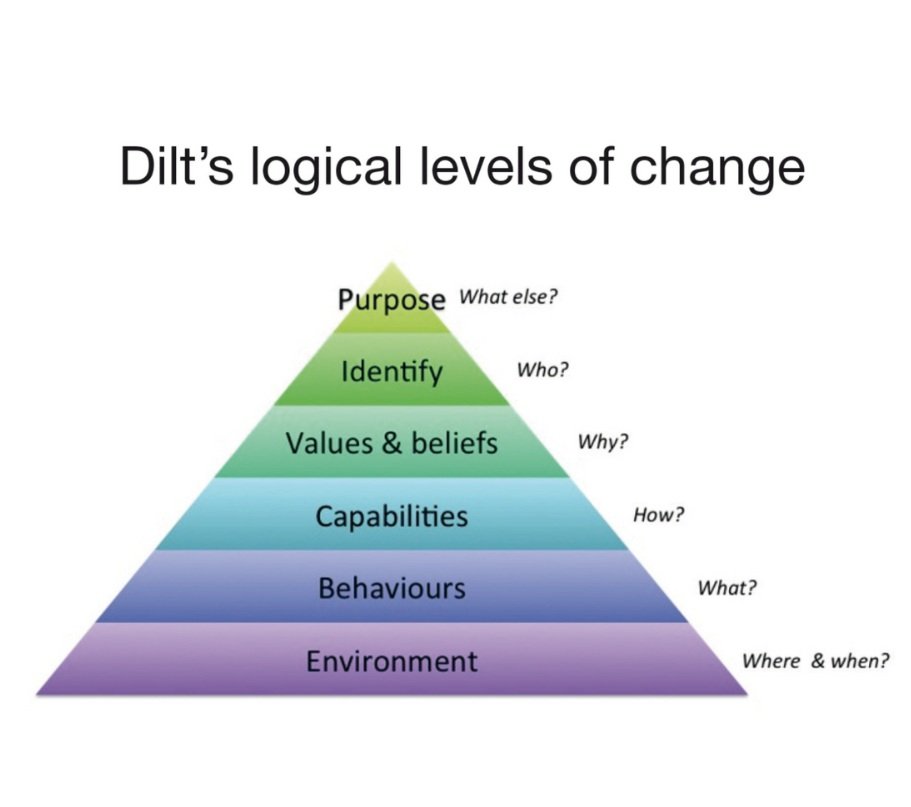7 Steps to Transformation
When was the last time you itched for a 'real' change in your life?
For me, it was in 2017 just before I left a long standing career at the University of Sydney to pursue a new role as Head of HR with a global travel insurance company entering the Australian market (completely unaware that a global pandemic is about to hit the world 2 years later and brutally 'kill' international travel). Preceding my career move, was an urgent desire for a big change. More than a change! I was seeking a complete transformation; one that happens on a deep level of beliefs and identity, with big questions such as: 'What do I really want?', 'What is my WHY?', 'What is the water I swim in?', 'Am I playing small to protect myself from disappointment?' and so on...
The change I was looking for wasn't just changing career and industries, it was way more fundamental. Like upgrading the operating system, not just upgrading a software.
Robert Dilts’ logical levels of change explains well how we experience our world, why some changes are so much easier to achieve than others, and why some last longer and some have us feel like we are back at square one. The levels are environment, behaviour, capabilities and competences, values and beliefs, identity and purpose.
Robert Dilts - Pyramid of Logical Levels of Change
Here are some examples for changes we could make on each level of Dilts' model:
Environment:
We change job or organisation
Move to a new house
Buy a new car
Behaviours:
Join a gym, yoga, or start meditating
Quit sugar and carbs
Try a new communication style
Capability:
Take up a course
Read a How To book
Listen to Podcasts
Transformation, however, is a very specific kind of change, and it happens on levels of beliefs & values, identity and purpose.
Let's have a look at those:
Belief & values
Values and beliefs determine the meaning we give events and situations in our lives. They also determine our behaviours as individuals or as a collective (e.g. company culture).
Beliefs and values can either reinforce or undermine capabilities. For example, a belief that you are ‘no good at public speaking’ could undermine any attempt to learn to present well.
Identity
Identity is about ‘who’ you are, your sense of self. Conversations on this level are often about self-actualisation.
To break this down further, Identity is our:
Assumptions of who we are
How we see others
What we believe is or isn't possible for us
Purpose/Vision
Purpose is about ‘what else’, beyond the individual, and related to being part of a bigger system, whether that be family, community or beyond. Some people describe this as the ‘wisdom’ level, and others exclude it altogether, or link it to identity, as being part of how you see yourself.
So, what did I do to cause the transformation I wanted back in 2017? I:
Made a commitment to find the ways to grow and play a bigger game. I put all your chips on myself.
Found a structure of accountability and joined a community who witnessed me and held me accountable.
Set a vision for what I wanted to create.
Questioned my own assumptions about who I am, who others are and what I believed was s possible (or not) for me.
Identified old stories and inner barriers.
Connect to an empowered story about myself.
Committed to show up in new ways which were aligned with my vision.
The result of this was a shift in mindset at the core levels of my identity and purpose. The job was just a wonderful by-product and one that allowed me to move on to the next level and level after that.
People who feel ready to transform one or more areas in their lives, and self-actualise, often hire a coach to support them to make changes on a level of identity and purpose.
The role of a transformational coach is creating a committed, dynamic, generative growth oriented relationships and serving as an activator of potentials, questioning assumptions, catalysing breakthroughs and designing growth pathways to step into a higher vision.
The pandemic has pushed many to re-assess their current life experiences and want to make long lasting changes to some structure in their lives, but don't necessarily know how. The key is transformation on the level of identity. Changing something on a higher level, means lower levels must also change to support it. Changing something on a lower level, however, does not necessarily impact those above.
Every Transformation is Change, but not every Change is Transformation - Jack Mizerow
Sign up to my Mpowered newsletter for more insights, practices and tips on personal empowerment and transformation.

